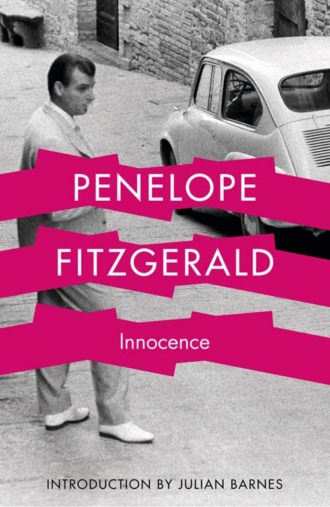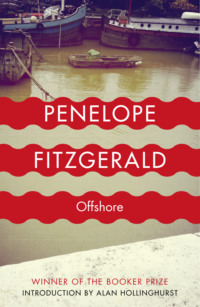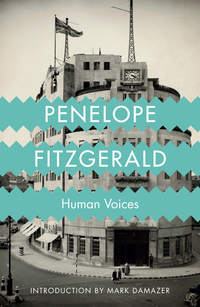
Полная версия
Innocence
‘Such people would not be suitable to serve your worship,’ Paolo went on. ‘I would advise you not to lament the scarcity of them at the Ricordanza. In respect to stock, or race, we must remember that, in Macchiavelli’s words, Nature has implanted in everything a hidden energy which gives its own resemblance to everything that springs from it, making it like itself. We can see the truth of this in the lemon tree, whose smallest twig, even if the tree is unfortunate enough to be barren, still has the fragrance which is the soul of the lemon.’ This letter was relevant, and it was civilized, but it was not helpful. With great difficulty and many enquiries the Ridolfi followed up reported instances of midget families, so that by the time she was six their only child had a retinue suitable to her position, a tiny governess, a tiny doctor, a tiny notary, and so forth, all to size. The child never went out, and was confident that the world consisted of people less than 1.3 metres high. To amuse her, a dwarf (not a midget) was sent for from Valmarana, but without success. She pitied him, because she thought how much he must suffer from knowing that, as a dwarf, he was different from anyone else at Ricordanza. Then, in trying harder and harder to make her laugh, he fell and cracked his head, which made the little girl cry so bitterly that he had to be sent away.
The Ridolfi suffered from having to practise so many deceptions on their daughter. But deception, to a quite unexpected extent, grows easier with habit. The whole property had, of course, been extensively adapted, although only one of the special stairways through the gardens remains today, with its miniature steps of grass and marble. As to the statues, none of them were made by local sculptors, though so many stone-quarries were handy. The commission was given to someone completely unknown, thought by some authorities to have been a Turkish prisoner of war.
At the same time Count Ridolfi heard of a little midget girl, illegitimate but of good family, who lived as far away as Terracina, and they arranged for her to come and live with them. Fortunately she was born dumb, or, at all events, when she arrived at the Ricordanza she was dumb. It was impossible, therefore, for her to describe the human beings she had seen while she lived outside the walls of the villa.
All the care and attention of the little Ridolfi were now for Gemma da Terracina. Having failed to teach this new and beloved friend to talk, which was something even the cage birds could do, she asked to give up studying Latin and Greek herself, or, at least, never to have them read aloud. Music was an even more serious matter. The Ridolfi had a private organist, and nobody who has ever seen it will ever forget the toy-like instrument in the salotto, whose sounds are still as clear as a bird’s. It must have been a sacrifice to silence this organ, and probably quite a needless one, since there was no proof that Gemma was deaf.
But less than twelve months later Gemma began to grow at a very noticeable rate, as though her body had set itself to make up for its eight stunted years. By the next spring she was a head taller than the family doctor, who lived with the chaplain and the notary in a suite of rooms built for them over the chapel. The doctor, consulted, had very little to suggest. He tried administering oil of juniper to stunt the growth, and then, when this failed, a remedy of Pliny’s, who says that Greek tradesmen used to rub a hyacinth bulb over young slaves to prevent the growth of pubic hair. The Ridolfi began to fear that their doctor was a fool. In anguish, they searched on all sides for better advice. Della Torre was, once again, of little comfort. Another letter of his, now in the Biblioteca Nazionale, points out the folly, in the last resort, of attempting to reverse Nature. ‘Don’t be so concerned,’ he adds, ‘with the matter of happiness.’ There is also an exchange between Ridolfi and his brother, the Cardinal Archbishop of Florence, who says nothing about Nature, but warns that human happiness must be left to Heaven. ‘Certainly,’ the Count replies, ‘as far as I myself am concerned, but surely I am right to exert myself on other people’s account, what better study could there be?’ And his daughter was not in the least concerned about herself, only about her friend. She knew, after all, that if Gemma were ever to have to go back to the outside world, where no-one was more than 1.3 metres in height, she would be treated as a monster — dumb, into the bargain, and unable to explain herself. The whole situation was cruelly embarrassing already. And the little girl took to walking a few steps ahead of Gemma, so that their shadows would be seen to be the same length.
The Count reflected that neither Nature nor Heaven has allowed for anyone, certainly not for any child, with such a compassionate heart as this only daughter of his. Impossible and unthinkable to separate her now from Gemma, and he was driven to promise her that if she could think of any way to help Gemma in her desperate condition they would try it, no matter what the cost.
She was now about eight years old, the age at which the mind works logically and without hesitation on what it has learned so far, because it is not troubled by the possibility of any other system. It was for this reason (for instance) that she had never questioned the fact that she herself was confined to Ricordanza. She knew, on the other hand, something about pain, and that it was worth suffering to a certain extent if it led to something more appropriate or more beautiful. Sometimes, for example, when it was a special occasion, she had her hair curled. That hurt a little. The lemon trees, too, on the terraces of the Ricordanza, were sometimes dipped by the gardeners in boiling water, so that they lost all their leaves but the new leaves grew back more strongly.
Meanwhile, Gemma had taken to going up and down the wrong steps in the garden, the old flights of giant steps which had been left here and there and should have been used only for the occasional games. The little Ridolfi made a special intention, and prayed to be shown the way out of her difficulties. In a few weeks an answer suggested itself. Since Gemma must never know the increasing difference between herself and the rest of the world, she would be better off if she was blind — happier, that is, if her eyes were put out. And since there seemed no other way to stop her going up and down the wrong staircases, it would be better for her, surely, in the long run, if her legs were cut off at the knee.
2
This story is not the one given out nowadays in the leaflet provided by the Azienda di Turismo or by the Committee for Visiting the Most Beautiful Villas of Florence — it starts in the same way, but ends differently. Nor, probably, is the Ricordanza, for all its high and airy position, for all its lemon terraces, really one of the most beautiful villas of Florence. Nor, in a sense, is the present Count Ridolfi really a Count, although the leaflet calls him that, because all titles were abolished in Italy after the Second World War. And, in the course of their descent, the Ridolfi family has taken so many turns and half-turns, so many doubtful passages, that the past generations can hardly be held responsible for those of the twentieth century. No more midgets among them now. Still a tendency towards rash decisions, perhaps, always intended to ensure other people’s happiness, once and for all. It seems an odd characteristic to survive for so many years. Perhaps it won’t do so for much longer.
3
In 1955 Giancarlo Ridolfi, at the age of sixty-five, had made a serious decision to outface the last part of his life, and indeed of his character, by not minding about anything very much. But his resolution was shaken not only by his love for his daughter Chiara, but by concern for his elder sister, Maddalena. This was at the time when Chiara, having just turned eighteen, told them that she wanted to marry a doctor, Doctor Salvatore Rossi. He was young, not so very young, thirtyish, a specialist at the S. Agostino Hospital, clever, very hard-working. ‘Hard-working, I suppose that means he’s from the South,’ said Maddalena.
Giancarlo had been born in 1890, by which time the Italian nobility had been put in their place, and no longer held important public office. His father had brought him up quietly on the small family farm of Valsassina, thirty kilometres to the east of Florence. All of them lived quietly, in reduced circumstances (the Ridolfi were never, at any time, successful with money). The old Count had his clothes made by a country tailor, and went down in the evening to drink wine, the wine from his own estate, at the village cantina, where jokes improved every time they were repeated. Until the 1900s the family had never been to the seaside and had no idea that it might be a place to go to, instead of the mountains, for holidays. In 1904 they suddenly all went to Milan, about which they had known nothing either, to hear the first performance of Madam Butterfly. It was as if the clouds had opened, then they went back to Valsassina. When the cinema came to the village they were allowed to go to the tattered old Terza Visione movies which were projected onto the whitewashed yard wall of the cantina. If anyone got up to go to the urinal their shadows crossed the screen in giant’s form. The one other concession which the old Count made was to buy his son a new kind of toy, a wristwatch: this was in 1910, not long after the first wristwatch was created for the aviator Santos-Dumont. After that he liked to ask the small boy, whenever occasion arose — Well, tell us the time! — but the occasions weren’t so frequent in a place like Valsassina where the hour of the day was obvious enough from the length of the shadows. All the same the tenants in the fields and the servants who joined in the conversation as they handed round the dishes couldn’t resist asking the child to take another look — Tell us the time!
When he was eleven, the father died. The younger brother stayed on at the farm. Relatives took Maddalena and Giancarlo in hand, but they were separated. Giancarlo was sent first to England, and then to Switzerland, to learn business, but could make nothing of it, and not much more of the philosophy of Benedetto Croce, which he studied at university. He fought through the First World War in the cavalry, and was employed afterwards in the Remounts department. In 1931 his old philosophy teacher became one of the handful of professors who protested against Fascism. He was dismissed, and appealed for help. Giancarlo remembered that Croce had taught that politics were a mere passion, not the right occupation for a thinking man, but did not like to let his teacher down. As a result he found himself under house-arrest at the cliff-like family palazzo in Florence. Most of the rooms were let out, but only very low rents, if any, are paid to a man in disgrace. He was obliged to tell Annunziata, the cook, that he had no ready money, by which he really meant that he seemed to have no money of any kind. Annunziata knew this, and told him that he ought to take good advice.
His younger brother was an uncommunicative man, with a wife who was not encouraged to talk either, and a silent little son. But there was a brother-in-law, a Monsignor Gondi who was at the Curia and knew everyone in Rome. Giancarlo consulted him, and Giuseppe Gondi went so far in compromising himself as to answer by post, though in general terms. ‘So far you have not been well advised. Pray and meditate constantly, and follow the traditions of your country and of the ancient nobility.’ Giancarlo thought over these words and their unspecified meaning for some months, and then followed the strongest tradition of nobility he could think of by marrying a wealthy American. But he had no acquisitive sense, and when war broke out once more she left him, an ageing father with a two-year-old daughter, and in the same precarious state as before.
How unfortunate that Maddalena, violently opposed to Mussolini and living in England, should have married a man who quite mistakenly thought she was a wealthy foreigner, and whose main interest lay in watching waterfowl and wading birds! However much thought one took, how could such a man be made happy? The turn their marriages took brought Giancarlo and his sister together again, or at least brought both of them to the apartment in the Piazza Limbo.
In appearance Maddalena had a meagreness which suggested that she might not be long for this world, although this was contradicted by her persistent good health. Her firmness Giancarlo would have appreciated if there had been any way of telling what she would be firm about next. Take the matter of the third and fourth fingers of her right hand. They were missing, having been taken off with a pair of sharp poultry-nippers by a thief sitting behind her on the 33 bus coming back from Bagno a Ripoli. The diamond ring given her by her English husband in their happier days was of course the object. The incident was not at all an unusual one, and the strong-minded Maddalena refused to make any kind of official complaint. She regarded the loss, she said, as a tax which all those who have something to be stolen must expect to pay. ‘Calculate in any given year to pay out one-fiftieth of your movable possessions,’ she said. On that principle, Giancarlo told her, she would lose one finger every five years. ‘How long do you intend to live?’
Chiara, coming and going from an English convent school, was distressed by her Aunt Mad. There was the matter of the Refuge for the Unwanted. The failure of old people to be happy tormented Auntie Mad. The rest of the population endures their company only on sufferance. No-one, even under religious obedience, enjoys being with the old for long periods — with one exception, however, babies, who are prepared to smile at anything even roughly in human shape. Why not, therefore, a Refuge where the old folk could wear out their days looking after homeless infants? The toothless would comfortably co-exist with the toothless. ‘But these ancients won’t be competent, they’ll forget which child is which.’ ‘At times, possibly.’ ‘They’ll drop them.’ ‘One child or two, perhaps, but what a sense of usefulness!’ In the confusion of the postwar, during the quarrelsome rebuilding of Florence, it was easy to do unusual things, even bribery was scarcely necessary. Pretty well all that she had left Maddalena spent on her foundation. It was in via Sansepolcro, and fortunately cost very little to run. The old women were all from the country. They were used to washing clothes in cold water, and scrubbing the floor with sand.
Giancarlo couldn’t remember what his sister had been like in their childhood. Remote though it was, she must, surely, have been like something, but never, he thought, like me.
Perhaps, at the moment, sitting in the second floor flat of the decrepit palazzo, in a salon full of marble statuary, as yellow as old teeth, but with a freshness in the light from the river only a street away, they were doing no more than talking things over, as others do. What distinguished them was their optimism. Even disagreements between them produced hope.
If Chiara was to marry this Doctor Rossi, where was the wedding lunch to be? They had thought, of course, of the Ricordanza. It was true that at any celebration there Annunziata would be an absolute nuisance. Insanely cautious, she insisted that any guests from Rome (with the exception of the Monsignore), or indeed from anywhere south of the Umbrian border, were likely to need watching. Before and after they left she counted the spoons in a raucous whisper. That had happened, for instance, when Giancarlo, with the idea of raising money on the property, had given a lunch party at the villa for some Roman bankers. But the scheme had been likely to fail in any case. Giancarlo was not the kind of person who ever made money. He should have applied himself harder to his business studies in Switzerland.
But then it turned out that Chiara didn’t, while deeply anxious not to distress anyone, want her wedding to be at the Ricordanza. ‘Where she used to play all morning!’ Mad exclaimed, ‘in the shadows of the lemon trees.’ It seemed, however, that Dr Rossi wasn’t in favour of it. But surely Chiara had a will of her own?
‘Of course she has,’ said Giancarlo. ‘That is why she is able to change her mind.’ And it became clear to them that Chiara wanted a country wedding. ‘That means the farm. I shall go out to Valsassina and talk to Cesare about it myself. He won’t know what’s going on, it won’t have occurred to him to ask. I shall go to Valsassina tomorrow.’
Конец ознакомительного фрагмента.
Текст предоставлен ООО «ЛитРес».
Прочитайте эту книгу целиком, купив полную легальную версию на ЛитРес.
Безопасно оплатить книгу можно банковской картой Visa, MasterCard, Maestro, со счета мобильного телефона, с платежного терминала, в салоне МТС или Связной, через PayPal, WebMoney, Яндекс.Деньги, QIWI Кошелек, бонусными картами или другим удобным Вам способом.







